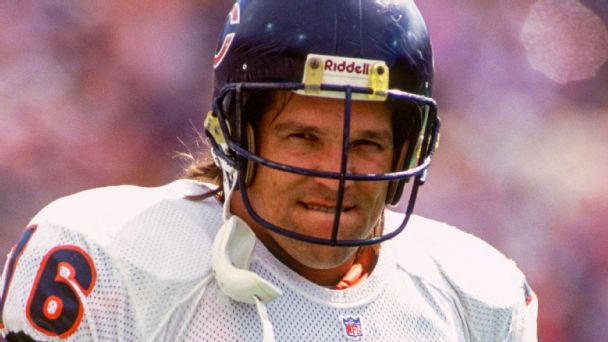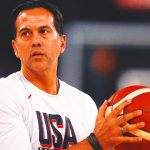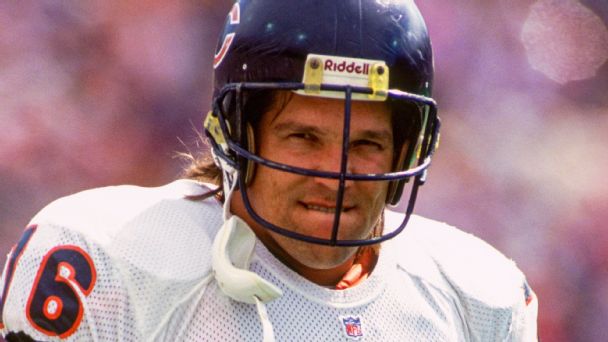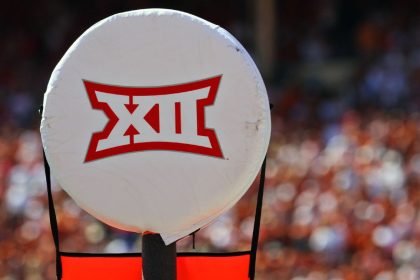
Editor’s note: This article originally ran in February.
9:49
SC Featured: The journey of Steve McMichael from ALS to the Hall of Fame
Former Bears defensive tackle Steve McMichael is on a journey not only fighting ALS, but also waiting for the call for the Hall of Fame.
MISTY McMICHAEL KNEW what she was supposed to do. They had talked about this. They’d talked about this exact situation.
How could they not? Misty’s husband, Steve McMichael, was diagnosed with ALS in 2021. The paralysis of the disease steadily, agonizingly, took hold. Steve was at the heart of the legendary 1985 Chicago Bears defense, a beloved rebel who hunted rattlesnakes and had a second act as a professional wrestler and spent most days bopping and bouncing and talking and laughing. But by August of 2023 he was confined to a bed, unable to move or speak.
Steve made clear he didn’t want to be in hospitals. He didn’t want it and neither did Misty. If things got bad, Steve, who is 66, wanted to be at home — snuggled under his Bears sheets and looking at the pictures in his room: Steve at the Super Bowl or Steve with the wrestling legend Ric Flair or Steve with his daughter, Macy. Steve didn’t want to go to a hospital because that meant he might die at a hospital, and, well, in the middle of an experience in which you literally lose control of everything, he wasn’t losing control of that.
Misty and a group of nurses took care of him. They checked his breathing tube and his feeding tube. They sat him up and laid him back. They talked to him. They listened when he would use a computer to communicate, a robotic voice droning phrases like, “I need drugs” or “Everybody out of my room” or “I want ice cream” (vanilla Häagen-Dazs, preferably).
But one day last summer, Misty could tell something wasn’t right. It happened so fast. Steve was feverish. The mucus in his breathing tube was a swirl of colors and darker than usual. He was having trouble staying awake. A doctor came to the house. It was pneumonia, the doctor said.
Misty knew what that meant. And she knew that the DNR, the “do not resuscitate” form she and Steve had signed months earlier, meant she wasn’t supposed to call an ambulance. Because Steve absolutely, positively wasn’t going to a hospital.
Except …
Except they’d gotten a telephone call a few days earlier.
Misty went to Steve. She held his hand. She looked at him and said, “Honey, the Hall of Fame called, do you remember?”
She said, “You’ve been waiting so long … And if you get in, I want you to be here. I want you to see it.”
Misty knew she couldn’t promise anything. The Hall had said Steve was one of 12 Senior semifinalists for the 2024 class. Steve had been nominated for the Pro Football Hall of Fame in the past, and there was no way to predict if this would be just another instance of building up hope only to be let down. She also didn’t know if Steve even had the strength to make it a few more days, let alone months. But in that moment, the only thing Misty did know for sure was that the man she loves was closer than he had ever been to this thing he wanted so much. And so she thought that he might want to try.
“Do you want to see it happen, honey?” she asked, and Steve’s head shifted. His eyelids had been fluttering, but suddenly they steadied. He was staring at her. Misty locked her gaze on Steve’s face.
“Do you want me to rip up the DNR?” she asked. “Blink once for yes, twice for no.”
Misty held her breath as Steve looked up at her. He blinked once.
THE OBVIOUS QUESTION, the question everyone asks, is the simplest one: Why?
Why do it? Why hurt even longer? ALS is a terminal disease with no cure, a disease that ravages a person’s muscles and has a mean survival time of 2-5 years after diagnosis. The McMichaels considered the totality of the situation when they made their initial choice to sign the DNR, so why change their minds and extend an excruciating inevitability on the chance that a bunch of men in a room somewhere might decide that a version of Steve from decades ago was now, suddenly, outstanding?
The short answer is plain: “When you’re from Texas,” Misty says, “football is all you do.”
It’s a joke, but it isn’t. In high school in Freer, a small town in South Texas, Steve lettered in six sports, one of those athletes who could do it all. He committed to football, though, and once he did, it made him.
He was an extraordinary lineman, a jackhammer slamming through his opponents over and over and over. He was a college All-American at Texas. He won a Super Bowl in Chicago. He had 95 NFL sacks, third most in history by a player lined up as a defensive tackle. He wasn’t a national name with the Bears because he played on a team full of them, but football analysts — both then and now — say the same thing: Steve’s work on the defensive line set up the other rushers, including the legendary Mike Singletary, to wreak the havoc that they did.
“One of the things McMichael was asked to do [was] keep the blockers off the linebackers,” said Dan Pompei, who covered the Bears for the Chicago Sun-Times for 14 years and has written about the NFL for four decades. “But he made as many plays as any of them. He was really supposed to be a role player, but he was so much more than that.”
Steve was the fabric of the Bears, the underpinning, the foundation. From 1981-1993, he played in 191 consecutive games for the Bears — more than Walter Payton, more than anyone in the team’s history.
“When I was a kid, one of my heroes was John Wayne [and] Steve McMichael was John Wayne,” Singletary said. “He may have been shot in the arm, may have been stabbed in the back, but if you were counting on him to get something done, he was going to get it done.”
There was an indelible persona to McMichael, to be sure — Steve smashing a bottle over his head, Steve writing off-color phrases on his helmet in marker, Steve being asked in an interview how the Bears’ defense planned to deal with a particular opponent and, on live television, pulling out a switchblade and casually cleaning his teeth as he said, “We’ve got definite plans for that little guy.” Wherever he was, Steve lived big.
But at his core, there was always the game. Steve is in the Texas High School Football Hall of Fame. He is in the Texas Longhorns Hall. He is in the College Football Hall. For him, the Pro Football Hall of Fame isn’t a vanity thing or an ego thing; it’s about finishing something. It’s about a conclusion. It’s about being in the middle of an ending that is so much more brutal than anything he could have ever imagined, and somehow finding an ending that he actually wants.
For Misty, it’s different. She met Steve in 1998, three years after he was done playing. He was a WCW wrestler then, an imposing presence with a ponytail down his back and sunglasses on at midnight when he walked into Pearl’s Oyster Bar in Austin, Texas, and sat down next to her. “You can’t have me,” he said to her with the worst kind of bravado. “Who said I wanted you?” she replied, her eyes rolling all the way down the back of her skull. They’ve been together ever since.
Misty never knew the Steve who was so fired up to play in Super Bowl XX that he threw a chair straight through a chalkboard in the team meeting room. She never knew the Steve who paired with Dan Hampton to do the dirty work in the trenches and guzzled Crown Royal together on the team plane after games. She never knew the Steve who once slammed his helmet into his own face in a pregame locker room, licked the blood running down his cheek and shouted, “That’s right boys! I’m ready to play football!”
Steve’s Bears teammates nicknamed him Mongo, after the gigantic (and oddly philosophical) strongman from “Blazing Saddles,” and it was a character he both embodied and embraced.
“We would laugh about it,” Hampton says. “We’d say, ‘We’re so thankful they didn’t have cell phones back then because we’d have been in a lot of trouble.'”
The man Misty got to know was still outlandish, but his antics were always leavened by the other side, the side when Mongo disappeared and Steve emerged, holding her hand, or wrapping his arm around her or grabbing at her hips. Their love is the enduring kind, the sickness-and-health kind.
Misty can laugh at the old video of when Steve — as the celebrity singer of “Take Me Out to the Ball Game” at Wrigley Field one day in 2001 — got stared down by an umpire after using the PA to complain about a bad call, because she also sees in her mind’s eye the images of Steve cradling an infant Macy in his forearm or playing video games with Macy as a tween, hollering as the two of them tried to save (or maybe destroy) the world at night while sitting in the living room.
For the last three years, Misty has been at the center of Steve’s care: helping the nurses and changing the sheets and tracking the oxygen tanks and sliding a spoonful of vanilla Häagen-Dazs onto Steve’s tongue when he asks for something sweet. Taking care of his physical needs is her job now.
But she knows, too, that it is also her job to help Steve bring the pieces of his life together in a way that feels satisfying for him, in a way that feels complete. Even though she didn’t live it with Steve the first time, she has found herself at the center of his old life, too, his football life, as the Bears’ brotherhood has embraced Steve in a way that is deep and full and abiding.
Everyone visits: Jim McMahon, Gary Fencik, Keith Van Horne, Singletary, Hampton, Richard Dent. Payton’s son, Jarrett, is a constant. When Steve couldn’t walk anymore, Hampton and Dent built ramps at the house for his wheelchair. When Steve became bedridden, the teammates would come with a guitar and sing with him. Or read with him. Or watch TV with him.
They also talk with him, reminisce with him: about Mike Ditka and Buddy Ryan and pulverizing quarterbacks and breaking curfews and, of course, about that sweet, sweet night in January of 1986 when they ran the Patriots out of the building, 46-10, and won the Super Bowl in New Orleans.
All of them want the Hall of Fame for Steve for the same reason Misty does: because Steve wants it. And because they love him. And because it will be another part of his legacy that will linger in history in bold print bigger than some brutal disease.
“At this point,” Hampton says, “there’s nothing that could be of any value to him except something like this.”
AFTER STEVE BLINKED once last August, Misty did rip up the DNR and called the ambulance. The medics came quickly, but Steve’s body lapsed into sepsis, and he slipped into a coma on the way to Silver Cross Hospital.
“He passed out, he almost died,” Misty says. “He didn’t come to until the next morning. Once you’re septic, you don’t normally come back from that. But he did.”
It was just one of many scares. There was an infection last fall; some anxious days each time Steve’s various tubes needed to be removed and replaced; and then, near Christmas, an incident when a former nurse accidentally unplugged Steve’s ventilator and Misty found her husband turning purple. She saved him by quickly connecting him to the portable ventilator that goes on his wheelchair.
Through each of those — and through the other days, too, the less dramatic but no less difficult days, the days where it’s just the routine of taking care of an ALS patient — the wait on the Hall has been a constant. Steve made it past the first cut of candidates twice before, in 2014 and 2015, only to fall short. This year, those around Steve cautioned him and Misty against thinking anything might change, and even Pompei, the journalist who made the case for Steve in front of the Hall’s committee, wasn’t sure which way the vote would go. Misty was the only one who was optimistic from the start; she told anyone who would listen that this was going to be the year.
It had to be, she would say. It had to be.
On Jan. 24, a dank and dreary day in Homer Glen, the small town outside Chicago where the McMichaels live, Misty’s phone rang with a FaceTime call. It had been a hard morning — Steve was uncomfortable and irritable and drowsy — but there was Dent on Misty’s phone, one of the six members of the ’85 Bears who are already in the Hall of Fame. Misty squealed when she saw Dent wearing his gold Hall of Fame jacket, and she went into Steve’s room and laid her head next to his on the bed. She held up the phone in front of them.
“I’ve gotten the privilege to call you guys …” Dent began, and a yelp from Misty caught in her throat.
“… to let Steve know that he’s now in the Class of 2024,” Dent said.
Steve’s eyes moved side to side, watching Dent. As his former teammate told him and Misty that he could throw away his No. 76 Bears jersey because he’d now be getting a gold jacket of his own, Steve strained to raise up his entire face and curled his lips into a smile.
“Oh, I see that!” Dent said, cutting himself off.
“That’s so awesome,” Misty said, stroking Steve’s shoulder.
“It’s your turn this time, brother,” Dent said. “It’s your turn.”
A few moments later, the call ended. Steve slumped in his bed. A nurse gave him some medicine and he was asleep within minutes. In her socks, Misty padded out through the kitchen. She was calm, measured even.
“It was overdue,” Misty says. “It was just time.”
After years of waiting, it might have felt strange to no longer have to wonder about something so significant. But like so many caregivers, Misty had already decided what to focus on next. For her, looking backward hurts too much; looking forward is the only way.
She checked into it: The Pro Football Hall of Fame is in Canton, Ohio, or just under 400 miles from Homer Glen. The induction date for the Class of 2024 is Aug. 3.
In the weeks and months between now and then, Misty plans to talk with Steve about what he wants to say in his speech. She plans to look into medical airplane flights and mobile units. She plans to see how, just maybe, her husband could get from his room in Illinois to the stage in Canton, be with his teammates one more time and watch her stand up behind that big podium and bigger crowd and deliver his words to the football world.
There will be hard days — she knows that. There will be moments when it seems impossible. But as soon as Steve blinked at her that afternoon, Misty was determined to help him fight to get all the way to Canton.
After all, that was right around the time Steve added a new option to the computer he uses to speak for him, the one that has those phrases on it like, “I love you” and “I’m in pain.”
Misty still remembers how it made her feel the first time she heard it. “We’re going to Canton!” she had just trilled, as she often did around the house when she was trying to stay positive, but this time Steve had a reply.
“Let’s go,” the voice called out from his room. “Let’s go.”









